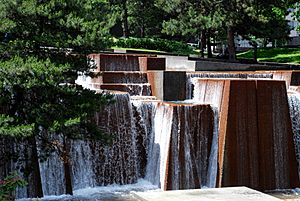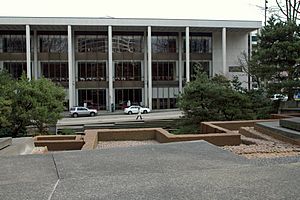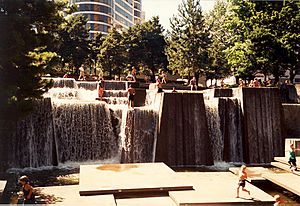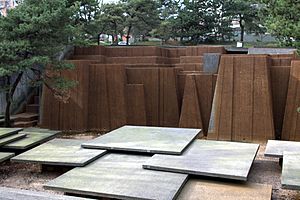Keller Fountain Park facts for kids
Quick facts for kids Keller Fountain Park |
|
|---|---|

Keller Fountain with water flowing
|
|
| Lua error in Module:Location_map at line 420: attempt to index field 'wikibase' (a nil value). | |
| Type | Urban park |
| Location | Portland, Oregon |
| Area | 0.92 acres (0.37 ha) |
| Created | 1970 |
| Operated by | Portland Parks & Recreation |
| Status | Open 5 a.m. to midnight daily |
Keller Fountain Park is a city park in downtown Portland, Oregon. This 0.92-acre (0.37 ha) park first opened in 1970. It was originally called Forecourt Fountain or Auditorium Forecourt. The park is located across the street from what is now Keller Auditorium.
In 1978, the park was renamed after Ira C. Keller. He led the Portland Development Commission (PDC) from 1958 to 1972. The PDC was a group that helped plan and develop parts of Portland. The nearby Civic Auditorium was renamed Keller Auditorium in 2000. However, that building is named after Ira's son, Richard B. Keller.
The main part of the park is its large concrete water fountain. This fountain is often seen as a very special part of downtown Portland. In 1999, it won an award from the American Society of Landscape Architects. The fountain was designed by Angela Danadjieva. She got her ideas from the beautiful waterfalls in the Columbia River Gorge, east of Portland. Even though the park is called Keller Fountain Park, the fountain itself is named Ira Keller Fountain. The fountain's pools hold 75,000 US gallons (280,000 L; 62,000 imp gal) of water. The waterfalls pump 13,000 US gallons (49,000 L; 11,000 imp gal) of water every minute.
Contents
Park History
Before it became a park, this area was home to a popular tavern. It was run by Bud Clark, who later became the mayor of Portland. Clark bought the tavern, which was first called "Dot Tavern," for $1,600. He renamed it the Spatenhaus and opened it in October 1962.
The area was part of a city plan to rebuild and improve older parts of Portland. This plan was called "urban renewal." Because of this plan, Clark lost his lease when the PDC bought the land in May 1967. The PDC then asked the company Skidmore, Owings & Merrill to create plans for the park. Their first ideas included a fountain, a traffic circle, and underground parking.
However, Walter Gordon, an adviser to the PDC, had concerns. In July 1968, the Lawrence Halprin & Associates landscape design firm was hired to design the park. This happened partly because Gordon pushed for them.
Designing the Fountain
Angela Danadjieva, a designer at Lawrence Halprin & Associates, was in charge of the fountain's artistic look. She had previously worked on set designs for films in Bulgaria. In the early 1960s, she moved to Paris and studied art. Later, she came to the United States.
Ira Keller gave her a book about the waterfalls of the Columbia River Gorge. This book gave her the ideas for the fountain's design. The Schrader Construction Company built the park for $512,000.
Park Opening and Celebration
The park officially opened on June 23, 1970. Lawrence Halprin, the designer, spoke at the dedication. He asked the people of Portland to come together. This was important because there had been protests at Portland State University just weeks before. Halprin said, "I hope this will help us live together as a community." As the water started flowing, Halprin, still in his jacket and tie, walked into the fountain.
Many important people attended the opening. These included author Jane Jacobs, Mayor Terry Schrunk, and PDC chairman Ira Keller. A newspaper article from 2003 described the event. It said the opening became a local legend. City officials gave speeches at the bottom of the fountain. Hundreds of young people gathered at the top. When the water started flowing, any tension disappeared. The officials politely clapped, but the young people jumped into the water, cheering.
Halprin turned to the crowd and said, "As you play in this garden, please try to remember that we are all in this together." He wanted to show that the design was for everyone.
Running and Maintaining the Fountain
In 1988, the Portland Water Bureau was surprised by how much it cost to run the fountain. At that time, it cost $34,000 for water and $13,000 for electricity each year.
In 1993, Mayor Vera Katz asked all city departments to find ways to save money. The Portland Water Bureau suggested turning off fountains, including Keller Fountain. However, a newspaper article said that people would likely be very upset if the water was turned off.
Sometimes, people put dish soap in the fountain. This is called "soaping." It creates huge amounts of foam and can cause more than $1000 in damage. This is because the fountain then needs to be drained and cleaned. The first "soaping" happened the night before the fountain opened. Another incident happened in September 2002. In 2007, the Portland Water Bureau shared the name and photo of a 19-year-old who put soap in the fountain. This incident was talked about in many news outlets. The fountain was "soaped" at least four times in August 2007 alone.
From May to late August 1996, the park was closed for a $700,000 renovation. This work included fixing and upgrading filters and pumps. It also added automatic chlorination, repaired the cement, and updated the lighting system. The fountain was also shut down for 10 months in 1997 and 1998. During this time, the water bureau replaced an old pump. In spring 2000, the pipes were also relined with a special plastic. This was a costly job because the original pipes were built right into the concrete.
In 2001, the Halprin Landscapes Conservancy was formed. A 2008 article in The New York Times said that Keller Fountain was one of Lawrence Halprin's best works.
Park Features
The park's pools hold 75,000 US gallons (280,000 L; 62,000 imp gal) of water. The waterfalls pump 13,000 US gallons (49,000 L; 11,000 imp gal) per minute. While Portland Parks & Recreation takes care of the park, the Portland Water Bureau became responsible for the fountain in 1988.
The park is known for being easy to access. Visitors can stand at the top of the waterfall. The design includes safety features to stop people from falling down the waterfall. The top of the falls has 36 inches (910 mm) deep water pockets. These act as a safety wall. City officials were worried about people falling. They had wanted a fence at the top.
Trees in the park include shore pines. For many years, a popular food cart serving bento has been located in the park.
Events at the Park
In 1987, jazz musician Tom Grant played a piano solo in the park. This was for a TV advertisement. In 1988, a parade for The Music Man started at the fountain. Actors John Davidson and Sally Spencer walked from the fountain to Pioneer Courthouse Square.
In September 2008, the Time-Based Art Festival held a performance called "City Dance of Lawrence and Anna Halprin" at the fountain. The Oregonian newspaper called it a "brilliant achievement." The event featured music by Morton Subotnick.
 | Valerie Thomas |
 | Frederick McKinley Jones |
 | George Edward Alcorn Jr. |
 | Thomas Mensah |




